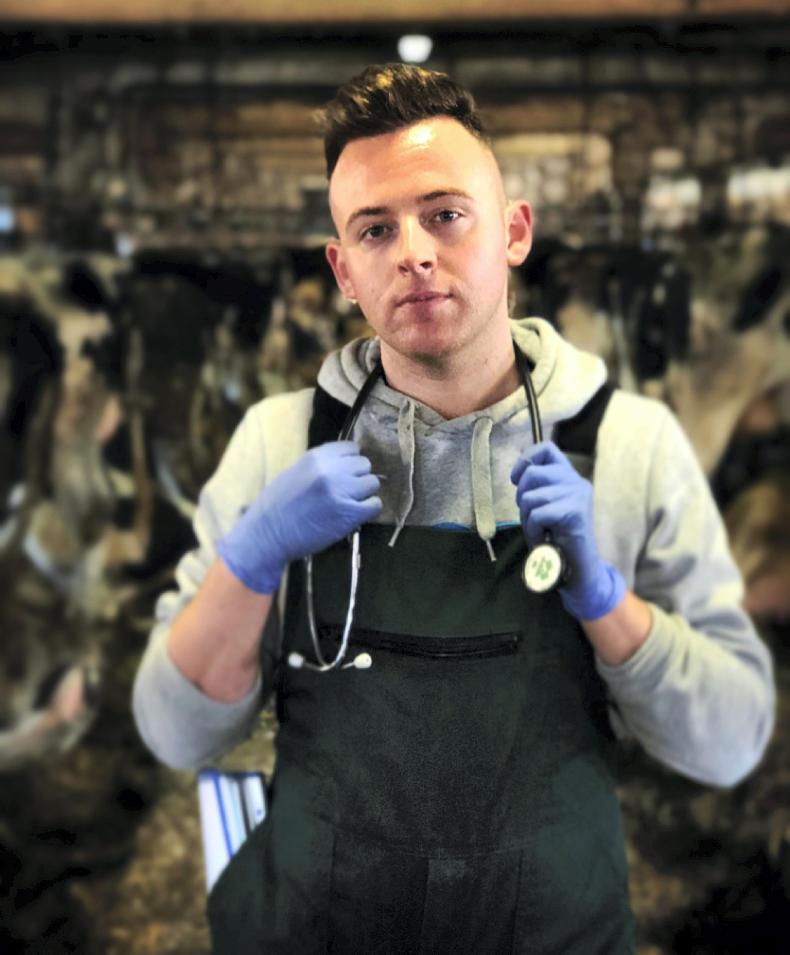In Ireland today, only one college, UCD, offers veterinary medicine. In 2018, the points for this course were 560 (up from 555 in 2017 and 565 in 2016) and even this did not guarantee those who achieved this, entry into the course.
In September, Rebecca Carter took the State Examinations Commission (SEC) to the High Court when the marks in her Leaving Cert were incorrectly added up. Rebecca wanted to study veterinary medicine in UCD and had already repeated to do so. While her story of taking the SEC to court and winning may be extraordinary, repeating to achieve the points for veterinary medicine is not. She may be the good news story but there are plenty who don’t get the fairytale ending.
Over the last year it has been widely reported, not least by this publication, of the shortage of large animal vets. An increasing number of vets entering smaller animal practises is posing the problem; where will we get the vets to attend to the needs of farmers in the future?
With just over 80 undergraduate positions coming from a single college with very high entry requirements each year, should students look elsewhere to study should they not get the chance to do so in UCD? This is certainly becoming a more popular option.
Recently, the Irish Farmers Journal revealed that figures obtained from the Veterinary Council of Ireland (VCI) showed that 42 Irish nationals with qualifications from abroad registered to practice veterinary medicine in Ireland in 2017, compared to 11 in 2010.
While Budapest is the most popular and well-known choice outside of the UK and Ireland, what are the other options across Europe that students can take, what are the entry requirements and how much will it cost to study there?
Note: All of the courses below are accredited by the Royal College of Veterinary Surgeons for registration to practise as a vet in the UK and Ireland.
Doctor of veterinary medicine
College: University of Veterinary Medicine, Budapest
Country: Hungary
Length of course: 5.5 years
Tuition fee (per year): €11,000
Students require six subjects at Leaving Certificate including at least two at H5 grade. Leaving Certificate subjects must include maths. Biology and chemistry are not required but are included in entrance exam. There is an interview.
Veterinary medicine, BSc
College: Wroclaw University of Environmental and Life Sciences
Country: Wroclaw, Poland
Length of course: 5.5 years
Tuition fee (per year): €8,000
Students require six subjects at Leaving Certificate are required including at least two at H5. Subjects must include maths, biology and chemistry. There is no entrance exam but there is an interview and a personal statement.
Doctor of veterinary medicine
College: Warsaw University of Life Sciences
Country: Poland
Length of course: 5.5 years
Tuition fee (per year): €8,400
Students require six subjects at Leaving Certificate including at least two at H5. Subjects must include maths. Biology and chemistry are not required but there is an entrance test in both subjects. There is no interview.
Master of veterinary medicine
College: Lithuanian University of Health Sciences
Country: Kaunas, Lithuania
Length of course: 6 years
Tuition fee (per year): €7,600
Students require six subjects at Leaving Certificate including at least two at H5. Leaving cert subjects to preferably include biology and chemistry. There are entrance exams but there are some exceptions. There is no interview.
Doctor of veterinary medicine
College: University of Veterinary Medicine Cluj
Country: Romania
Length of course: 6 years
Tuition fee (per year): €6,000
Students require six passes at leaving cert with three at H5 including two life sciences at H4. There is no entrance exam and no interview but a personal statement is required.
Doctor of veterinary medicine
College: Lublin University of Life Sciences
Country: Lublin, Poland
Length of course: 5.5 years
Tuition fee: €6,800 (this increases to €7,500 in year three)
Students need six passes at leaving cert, including two H5 grades. The six subjects must include biology and chemistry. Students with over 65% (H4) in both biology and chemistry can be accepted without doing the entrance test. There is an interview via Skype.
Doctor of veterinary medicine
College: University of Veterinary Medicine, Košice
Country: Košice, Slovakia
Length of course: 6 years
Tuition fee (per year): €8,000
Students require six subjects at Leaving Certificate including at least two H5 grades. Biology and chemistry are not required but included in entrance exam. There is no interview.
Doctor of veterinary medicine
College: University of Zagreb
Country: Zagreb, Croatia
Length of course: 6 years
Tuition fee (per year): €9,000
Students require six passes at Leaving Certificate, including biology and chemistry at a H3 grade. There is no entrance exam or interview. A personal statement is required.
Doctor of veterinary medicine
College: University of Warmia and Mazury
Country: Poland
Length of course: 5.5 years
Tuition fee (per year): TBD
This is a new programme for 2019.
Doctor of veterinary medicine
College: University of Veterinary and Pharmaceutical Sciences
Country: Brno, Czech Republic
Length of course: 6 years
Tuition fee (per year): €7,600
Students require six subjects at Leaving Certificate including at least two at H5 grade. There is an entrance exam but no interview.
Doctor of veterinary medicine
College: University CEU Cardenal Herrera
Country: Valencia, Spain
Length of course: 5 years
Tuition fee (per year): €12,060 (fees for first year including an enrolment fee are €15,060)
Six passes at Leaving Certificate are required, with an average grade of H4 but flexibility may be offered on grades. There is no entrance exam but an interview is required. Classes are taught through English in first and second year and in Spanish from third year on.
UK colleges accredited by the RCVS
A: University of Bristol or University of Liverpool.
B: University of Cambridge.
C: Royal Veterinary College London.
D: University of Edinburgh.
E: University of Glasgow.
F: University of Nottingham.

Colman Kelliher is a third-year student studying veterinary medicine in Lithuania.
Veterinary at Lithuanian University of Health Sciences
Colman Kelliher
I’m from Killarney in Kerry. I don’t come from a farming background but I have always been interested in animals and agriculture. I wanted to become a vet from an early age and I was always interested in animal health, how to cure animals and how their bodies work.
When it came to my CAO, veterinary medicine in UCD was my first choice but unfortunately I did not get enough points. At that time, I didn’t know about studying abroad. I ended up studying for a BSc in veterinary nursing at Dundalk IT for three years and afterwards working for 15 months in a small animal practise. It was when I was working here that I realised I wanted to pursuit a veterinary medicine course. With the degree I had, I was not able to get into UCD or the UK as I needed a level eight qualification so I decided to look abroad. I applied for three European colleges in January 2016 and decided on going to the Lithuanian University of Health Sciences (LSMU) in Kaunas. I chose it because it is the largest university in Lithuania with a track record of excellent education and high-quality graduates in veterinary medicine. Also, the course is taught through English which was vital for me.
In terms of the course, the professors are experts in their field and there are also on-site clinics for large and small animals.
This year I was appointed the Irish student ambassador for the veterinary faculty here and my aim is to highlight the opportunities that can come from studying veterinary abroad.
Studying abroad gives you the opportunity to live in a different country and interact with different nationalities.
In Ireland today, only one college, UCD, offers veterinary medicine. In 2018, the points for this course were 560 (up from 555 in 2017 and 565 in 2016) and even this did not guarantee those who achieved this, entry into the course.
In September, Rebecca Carter took the State Examinations Commission (SEC) to the High Court when the marks in her Leaving Cert were incorrectly added up. Rebecca wanted to study veterinary medicine in UCD and had already repeated to do so. While her story of taking the SEC to court and winning may be extraordinary, repeating to achieve the points for veterinary medicine is not. She may be the good news story but there are plenty who don’t get the fairytale ending.
Over the last year it has been widely reported, not least by this publication, of the shortage of large animal vets. An increasing number of vets entering smaller animal practises is posing the problem; where will we get the vets to attend to the needs of farmers in the future?
With just over 80 undergraduate positions coming from a single college with very high entry requirements each year, should students look elsewhere to study should they not get the chance to do so in UCD? This is certainly becoming a more popular option.
Recently, the Irish Farmers Journal revealed that figures obtained from the Veterinary Council of Ireland (VCI) showed that 42 Irish nationals with qualifications from abroad registered to practice veterinary medicine in Ireland in 2017, compared to 11 in 2010.
While Budapest is the most popular and well-known choice outside of the UK and Ireland, what are the other options across Europe that students can take, what are the entry requirements and how much will it cost to study there?
Note: All of the courses below are accredited by the Royal College of Veterinary Surgeons for registration to practise as a vet in the UK and Ireland.
Doctor of veterinary medicine
College: University of Veterinary Medicine, Budapest
Country: Hungary
Length of course: 5.5 years
Tuition fee (per year): €11,000
Students require six subjects at Leaving Certificate including at least two at H5 grade. Leaving Certificate subjects must include maths. Biology and chemistry are not required but are included in entrance exam. There is an interview.
Veterinary medicine, BSc
College: Wroclaw University of Environmental and Life Sciences
Country: Wroclaw, Poland
Length of course: 5.5 years
Tuition fee (per year): €8,000
Students require six subjects at Leaving Certificate are required including at least two at H5. Subjects must include maths, biology and chemistry. There is no entrance exam but there is an interview and a personal statement.
Doctor of veterinary medicine
College: Warsaw University of Life Sciences
Country: Poland
Length of course: 5.5 years
Tuition fee (per year): €8,400
Students require six subjects at Leaving Certificate including at least two at H5. Subjects must include maths. Biology and chemistry are not required but there is an entrance test in both subjects. There is no interview.
Master of veterinary medicine
College: Lithuanian University of Health Sciences
Country: Kaunas, Lithuania
Length of course: 6 years
Tuition fee (per year): €7,600
Students require six subjects at Leaving Certificate including at least two at H5. Leaving cert subjects to preferably include biology and chemistry. There are entrance exams but there are some exceptions. There is no interview.
Doctor of veterinary medicine
College: University of Veterinary Medicine Cluj
Country: Romania
Length of course: 6 years
Tuition fee (per year): €6,000
Students require six passes at leaving cert with three at H5 including two life sciences at H4. There is no entrance exam and no interview but a personal statement is required.
Doctor of veterinary medicine
College: Lublin University of Life Sciences
Country: Lublin, Poland
Length of course: 5.5 years
Tuition fee: €6,800 (this increases to €7,500 in year three)
Students need six passes at leaving cert, including two H5 grades. The six subjects must include biology and chemistry. Students with over 65% (H4) in both biology and chemistry can be accepted without doing the entrance test. There is an interview via Skype.
Doctor of veterinary medicine
College: University of Veterinary Medicine, Košice
Country: Košice, Slovakia
Length of course: 6 years
Tuition fee (per year): €8,000
Students require six subjects at Leaving Certificate including at least two H5 grades. Biology and chemistry are not required but included in entrance exam. There is no interview.
Doctor of veterinary medicine
College: University of Zagreb
Country: Zagreb, Croatia
Length of course: 6 years
Tuition fee (per year): €9,000
Students require six passes at Leaving Certificate, including biology and chemistry at a H3 grade. There is no entrance exam or interview. A personal statement is required.
Doctor of veterinary medicine
College: University of Warmia and Mazury
Country: Poland
Length of course: 5.5 years
Tuition fee (per year): TBD
This is a new programme for 2019.
Doctor of veterinary medicine
College: University of Veterinary and Pharmaceutical Sciences
Country: Brno, Czech Republic
Length of course: 6 years
Tuition fee (per year): €7,600
Students require six subjects at Leaving Certificate including at least two at H5 grade. There is an entrance exam but no interview.
Doctor of veterinary medicine
College: University CEU Cardenal Herrera
Country: Valencia, Spain
Length of course: 5 years
Tuition fee (per year): €12,060 (fees for first year including an enrolment fee are €15,060)
Six passes at Leaving Certificate are required, with an average grade of H4 but flexibility may be offered on grades. There is no entrance exam but an interview is required. Classes are taught through English in first and second year and in Spanish from third year on.
UK colleges accredited by the RCVS
A: University of Bristol or University of Liverpool.
B: University of Cambridge.
C: Royal Veterinary College London.
D: University of Edinburgh.
E: University of Glasgow.
F: University of Nottingham.

Colman Kelliher is a third-year student studying veterinary medicine in Lithuania.
Veterinary at Lithuanian University of Health Sciences
Colman Kelliher
I’m from Killarney in Kerry. I don’t come from a farming background but I have always been interested in animals and agriculture. I wanted to become a vet from an early age and I was always interested in animal health, how to cure animals and how their bodies work.
When it came to my CAO, veterinary medicine in UCD was my first choice but unfortunately I did not get enough points. At that time, I didn’t know about studying abroad. I ended up studying for a BSc in veterinary nursing at Dundalk IT for three years and afterwards working for 15 months in a small animal practise. It was when I was working here that I realised I wanted to pursuit a veterinary medicine course. With the degree I had, I was not able to get into UCD or the UK as I needed a level eight qualification so I decided to look abroad. I applied for three European colleges in January 2016 and decided on going to the Lithuanian University of Health Sciences (LSMU) in Kaunas. I chose it because it is the largest university in Lithuania with a track record of excellent education and high-quality graduates in veterinary medicine. Also, the course is taught through English which was vital for me.
In terms of the course, the professors are experts in their field and there are also on-site clinics for large and small animals.
This year I was appointed the Irish student ambassador for the veterinary faculty here and my aim is to highlight the opportunities that can come from studying veterinary abroad.
Studying abroad gives you the opportunity to live in a different country and interact with different nationalities.










SHARING OPTIONS